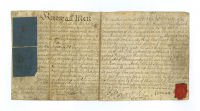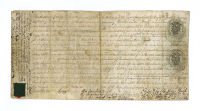 This curious piece of parchment (SHC ref 8791/1), measuring 29cm by 14cm, is what became known colloquially as a 'Tyburn Ticket'. (Just click on the image to enlarge it.)
This curious piece of parchment (SHC ref 8791/1), measuring 29cm by 14cm, is what became known colloquially as a 'Tyburn Ticket'. (Just click on the image to enlarge it.)
It is in fact a certificate, dated 11 August 1800, exempting one John Norman of Southwark, labourer, from all parish or ward duties. It was given to him by the Justices of the General Session of Gaol Delivery at Guildford for his part in the apprehension of John Armstrong who had been successfully convicted of stealing lead worth 6s 8d from Norman's house in St George's, Southwark.
 A Reward
A Reward
The issuing of such certificates dates from 1699 when an Act was passed offering exemption from certain parish or ward offices for life as a reward for the successful prosecution of capital offences, that is, crimes punishable by death. (The rather gruesome colloquial name 'Tyburn Ticket' comes from Tyburn, London, near present day Marble Arch, which was the site of the permanent gallows used for public executions in London from the sixteenth century until 1783). The Act was an attempt by the authorities to tackle rising crime rates by encouraging individuals to prosecute wrongdoers. Parish duties could be quite burdensome on those called to serve so exemption was obviously felt to be quite an incentive.
Certificates of exemption, however, proved to be very lucrative since they could be sold-on once. The back of this certificate shows that Norman almost immediately (on 23 August 1800) sold it to Benjamin Bond of Southwark, rag merchant, for the princely sum of £16 16s. A note in the margin indicates that Bond successfully used the certificate to be excused from serving as a juror in the court leet of Southwark Manor in 1802.
Rough Justice
Maybe Tyburn Tickets did act as an incentive to prosecution, though whether they also led to over-zealous prosecutions and false convictions is open to question. It seems there were cases where people almost made a career out of obtaining and selling-on such certificates - Joseph Nadin of Manchester, for example, apparently became quite wealthy on the proceeds in the early nineteenth century.
We do not know what happened to John Armstrong – theft of goods worth over 5s was still a capital offence in 1800 so he could have potentially lost his life for attempting to steal goods worth 6s 8d. Meanwhile his prosecutor, John Norman, gained £16 16s for his efforts. Perhaps it is just as well that the act enabling the granting of Tyburn Tickets was repealed in 1818.

